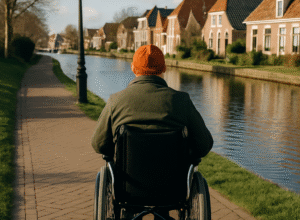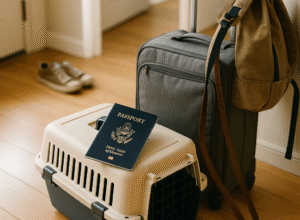Leaving Behind More Than Just a Country
When you board that one-way flight from America to the Netherlands, as I did in 2022, your luggage allowance might be limited to a few suitcases (I got away with two backpacks and a duffel bag), but what you’re truly packing is an entire framework for understanding the world. You’re carrying decades of cultural conditioning, unconscious expectations, and deeply ingrained notions of “normal” that are about to be gently—and sometimes not so gently—dismantled.
This journey across the Atlantic isn’t just geographical; it’s psychological. It’s the beginning of a profound rewiring of how you perceive yourself and your place in the world.
The Identity Recalibration
Perhaps the most unexpected challenge of moving to the Netherlands is the sudden identity shift. In America, you were simply you—with all your complexity, contradictions, and nuance. Upon arrival in Dutch society, you become, first and foremost, “the American.” Or, at the very least, “an American,” as there are several of us here now.
This label carries weight. It comes with assumptions, stereotypes, and expectations. Some positive (friendly, confident), some not (loud, possibly politically contentious). You find yourself simultaneously defending American perspectives you never personally held while also becoming hyper-aware of your own “American-ness” in ways you never had to consider before.
There’s a peculiar mental whiplash in being seen primarily through your nationality when you’ve spent a lifetime seeing yourself as an individual. You may find yourself performing an internal audit of which behaviors are authentically “you” versus which are simply cultural conditioning you never examined.
This recalibration of identity is disorienting but ultimately enlightening. It offers a rare opportunity to consciously decide which aspects of your cultural upbringing you want to preserve and which you might choose to release.
The Vulnerability Apprenticeship
The psychological strain of navigating daily life in a new culture cannot be overstated. Tasks that required zero mental bandwidth at home—grocery shopping, making small talk, setting up internet service—suddenly demand intense concentration and emotional resilience. Every single thing is an event.
In the Netherlands, this vulnerability is heightened by the Dutch language, which cheerfully combines sounds that American vocal cords seem fundamentally opposed to producing. There’s a special kind of psychological humility required to attempt speaking Dutch while a cashier switches to perfect English mid-sentence, both helping you and subtly signaling that your efforts, while appreciated, aren’t strictly necessary.
This constant state of beginner’s mind—of not knowing the unwritten rules, of misunderstanding social cues—can be exhausting. Yet it also creates a unique kind of mental flexibility. You learn to laugh at yourself (and tolerate being laughed at), to accept imperfection, to embrace being perpetually slightly confused. These are muscles that, once developed, serve you far beyond the expat experience.
The Time-Anchor Disruption
One of the more subtle psychological adjustments comes from the disruption of time anchors. Human brains mark time through cultural rituals and seasonal cues: Thanksgiving means fall, Fourth of July means summer, certain TV shows mark specific days of the week.
In the Netherlands, these familiar markers vanish. Instead, you have Sinterklaas in December, King’s Day in April, and a whole calendar of unfamiliar celebrations. Even the seasons feel different—Dutch winters are less about snow and more about enduring a seemingly eternal gray dampness that seeps into both clothing and mood.
This disruption creates a curious psychological effect where time simultaneously feels faster (due to the constant novelty) and more nebulous (due to missing familiar anchors). Many expats describe their first year as both the longest and shortest of their lives—each day packed with new experiences, yet the year as a whole passing in a disorienting blur.
The Directness Detox
American communication style operates through layers of politeness, implication, and social cushioning. We’re trained from childhood to soften criticism, to imply rather than state outright, and to preserve social harmony even at the expense of clarity.
The psychological adjustment to Dutch directness is less about developing a thicker skin (though that happens too) and more about unlearning deeply ingrained communication patterns. It requires rewiring your brain to stop interpreting straightforward feedback as rudeness and to stop searching for hidden meanings in simple statements.
This mental shift creates a fascinating metacognitive experience—you begin to observe your own reactions, noticing the flash of offense before reminding yourself of the cultural context. Over time, this awareness expands beyond Dutch interactions, leaving you more conscious of communication styles in all contexts.
Many American expats describe this directness detox as ultimately liberating. There’s psychological freedom in clear communication unencumbered by the mental gymnastics of decoding subtexts and implications.
The Circle of Control Realignment
A fundamental aspect of psychological well-being is understanding what you can and cannot control. Moving to another country and culture forces a dramatic realignment of this mental model.
In America, there’s a cultural narrative that with enough persistence, you can overcome any system, bend any rule, or find a workaround to any obstacle. The Netherlands offers a more structured reality. Dutch bureaucracy is based on consistency and process. Exceptions are rare, and administrative systems tend to follow predetermined paths.
This requires an emotional surrender of sorts—an acceptance that certain aspects of your new life will proceed according to Dutch systems and timelines regardless of your preferences. Learning to distinguish between what can be influenced and what must be accepted becomes crucial for maintaining sanity.
The paradox many expats discover is that this acceptance actually creates a new kind of freedom. Energy once spent fighting unwinnable battles can be redirected toward areas where meaningful progress is possible.
The Social Reset Button
Few aspects of the expat experience are as emotionally complex as rebuilding a social world from scratch. In America, your relationships developed organically over decades—childhood friends, college buddies, work colleagues who became more. These connections formed the emotional safety net beneath your daily life.
In an entirely new country, you’re starting over. This creates both vulnerability and opportunity in equal measure. The psychological challenge isn’t just loneliness (though that certainly visits); it’s the mental and emotional effort of forming meaningful connections without shared history or cultural shorthand.
Making friends in the Netherlands can feel like trying to crack a code. Dutch social culture, with its emphasis on planned gatherings and relatively closed social circles, requires a strategic shift for many Americans accustomed to more spontaneous socializing. You learn to be more intentional about relationship-building, more patient with the process, and more appreciative of genuine connections when they form.
This social reset also offers a rare opportunity for self-redefinition. Free from the expectations of people who’ve known you forever, you can explore aspects of your personality and interests that might have remained dormant in familiar surroundings.
The Comparative Thinking Trap
Perhaps the most persistent psychological challenge of my expat life is managing the constant mental comparison between Dutch and American approaches. Your brain becomes a perpetual cultural translator, continuously processing differences in healthcare systems, work-life balance, educational approaches, and social safety nets.
These comparisons can be enriching, offering new perspectives on both cultures. But they can also become a mental trap, especially when homesickness or frustration sets in—as it did for me about three months in. The danger lies in idealizing either system—seeing only the flaws in what you left behind or romanticizing America while focusing exclusively on Dutch shortcomings.
Developing a more nuanced mental framework—one that acknowledges strengths and weaknesses in both cultures—becomes essential for psychological equilibrium. The goal isn’t to decide which culture is “better” but to integrate aspects of both into your evolving worldview.
The Resilience Revolution
Beneath all these specific adjustments lies a profound psychological transformation that many expats only recognize in retrospect: the development of extraordinary resilience.
Each challenge overcome—each bureaucratic maze navigated, each linguistic misunderstanding survived, each cultural faux pas recovered from—builds confidence in your ability to adapt. The American who arrives in the Netherlands is rarely the same person who emerges after a year or two of this continuous adaptation.
You develop a deeper trust in your capacity to handle uncertainty. You cultivate patience with processes that can’t be rushed. You find humor in situations that once would have provoked frustration. Most importantly, you discover that your sense of self is both more flexible and more durable than you previously understood.
Living abroad builds emotional resilience—and not just for your time abroad. This becomes part of how you approach all future challenges, whether they involve international moves or entirely different life transitions.
The Integration Sweet Spot
As months become years, many American expats in the Netherlands describe reaching a psychological sweet spot—a state of integration that doesn’t require abandoning their American identity but allows for a more expansive sense of self.
In this state, you no longer feel like a perpetual outsider or visitor. You’ve developed mental shortcuts for navigating Dutch systems. You’ve built meaningful relationships. You’ve internalized certain Dutch values and perspectives while maintaining aspects of your American worldview that still feel authentic and valuable.
This isn’t about becoming Dutch—which is neither possible nor necessary—but about developing a more complex, nuanced identity that draws from both cultures. The psychological freedom in this integration comes from releasing the binary thinking that suggests you must be either fully American or fully assimilated.
Instead, you become a cultural bridge—someone who can move between perspectives, someone who can see the limitations and virtues of both worlds, someone who has expanded their understanding of what’s possible in structuring a society and a life.
For Those Contemplating the Journey
If you’re considering this transatlantic leap, understand that the most significant preparation isn’t about practicalities (though those matter) but about psychological readiness. Cultivate flexibility, patience with yourself, and a genuine curiosity about different approaches to life.
Remember that discomfort is inevitable but temporary. The mental disorientation of early expat life eventually gives way to a unique kind of clarity—one that comes from seeing your native culture from the outside while simultaneously gaining intimacy with a new one.
The psychological rewards of this journey are profound. Beyond the specific joys of Dutch life—the remarkable work-life balance, the cycle-friendly cities, the direct but caring relationships—lies the deeper satisfaction of knowing you’ve expanded your understanding of both yourself and the wider world.
In choosing to make this move, you’re not just changing your address; you’re rewiring your brain, recalibrating your emotions, and ultimately, revealing capacities for adaptation and growth you may never have discovered otherwise.








